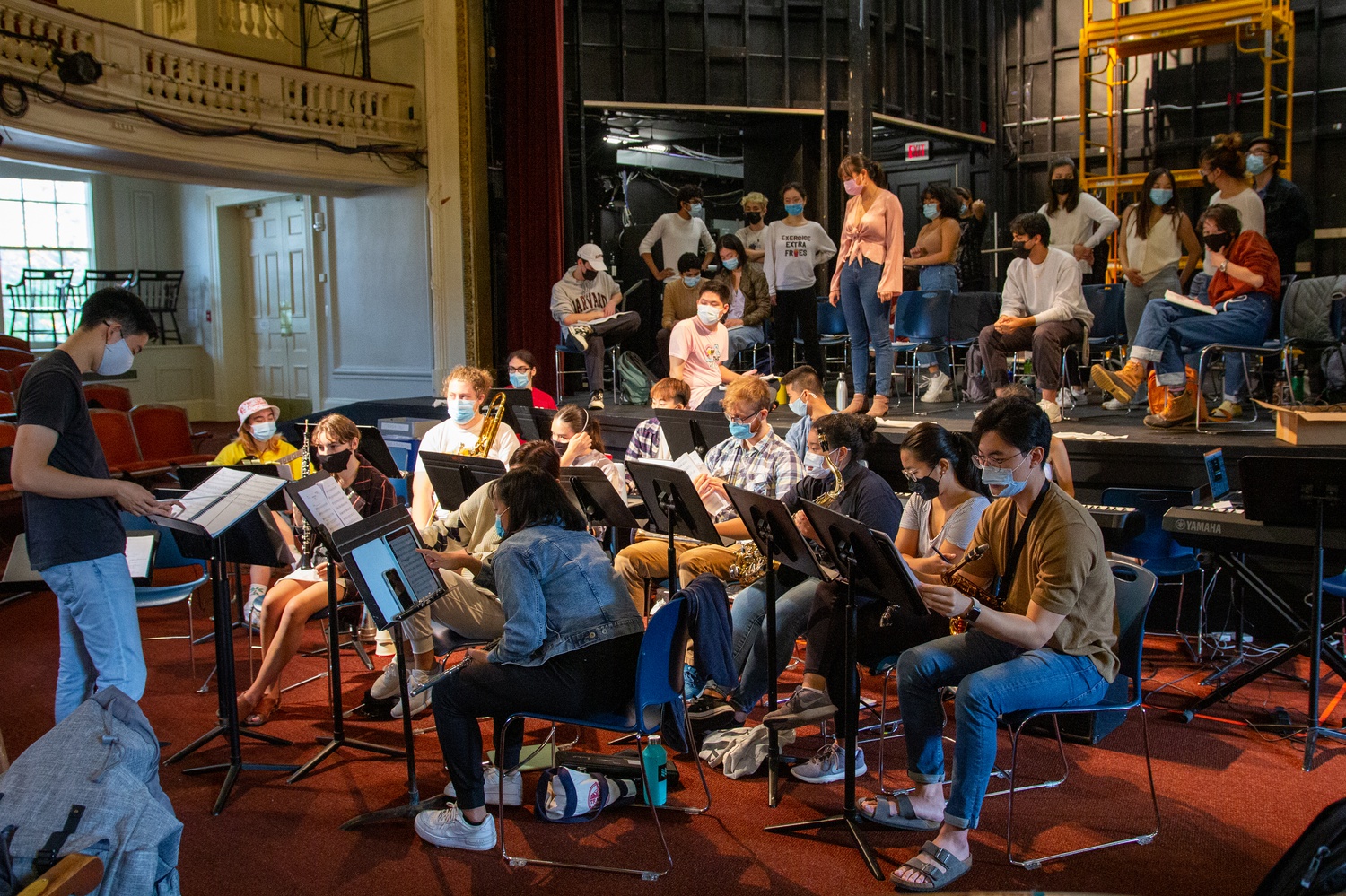
News
Cooke and Hirabayashi Failed To Meet Campaign Promises. To Students, It Reflects Broader Issues.

News
Judge Rules Against Theo Harper ’25 in Harvard IRC Lawsuit Following Removal Over ‘Stress Test’

News
‘Out of the Blue’: Students and Counselors Share Mixed Reactions to Harvard’s Return to Test-Required Policy

News
Chip City Cookies Set To Sweeten up Harvard Square in July

News
Harvard College Dean Khurana Defends PSC Suspension, Rejects Accusations of Bias
'Legally Blonde' Preview: A Pan-Asian Spin on a Harvard Classic

On one of the last Friday nights before midterms are in full swing, the last place you’d expect to find Harvard students is in the admissions office. But tucked into a portion of the building is the Agassiz Theater, where the Asian Student Arts Project rehearses everyday for their Pan-Asian production of “Legally Blonde,” which opened on Oct. 28.
ASAP is an organization for Asian students at Harvard who want to celebrate their artistic passions in conjunction with their identities. “We are constantly creating open spaces where pan-Asian students can feel like they have a space to express themselves and have their art lifted,” director and ASAP co-president Karina L. Cowperthwaite ’23 said.
The club’s culture is rooted in its theater presence, although ASAP honors arts of all forms. Ian Chan ’22–’23, one of the music directors of the production and a senior member of ASAP, has seen its members enthusiastically rally around the fall show. “People are really excited about being a part of our Asian arts community as a result of having been in ‘Legally Blonde,’” Chan said, “and conversely people a part of ASAP are excited about ‘Legally Blonde’ from being a part of our community.”
This semester’s musical, however, was unlike any other ASAP production put on in the past. All of ASAP’s past shows were written with Asian identities in mind, Cowperthwaite said. “Legally Blonde” is perhaps as far as you can get from that trend. Very few contemporary Broadway musicals highlight Asian American stories. “That's really hard when you're a theater group,” Cowperthwaite said. “Especially coming back from COVID, we really wanted to start off with a big production.”
But faced with this challenge, Cowperthwaite came up with the idea to put on a traditionally white musical in an all-Asian space. “I think what's been really exciting about that is seeing what that text looks like when it's with people who it wasn't necessarily written for,” she said.
Tia A. KwanBock ’25, who played Vivian Kensington in the production, agreed, and said she actually appreciated being able to explore other themes in addition to her identity. “I’m excited for the audience to see a show with an entirely pan-Asian cast where the plot is not entirely about being Asian,” she said.
With “Legally Blonde” in particular, the irony in this casting is quite powerful. Its plot is about a privileged white girl, who gets herself into Harvard at the drop of a dime in a quest for love. While Elle’s race is not specified, whiteness is deeply rooted in most people’s perceptions of the character --originally casted by Reese Witherspoon and later Laura Bell Bundy. So, a lot goes into racially coding this to fit a minority cast. “There are narratives and a history between Asian Americans and the Harvard admissions officers, like the lawsuit,” Cowperthwaite said, referring to Students for Fair Admissions v. Harvard College, “so all of a sudden, this narrative becomes a little bit politicized.”
But what does it actually mean to turn that narrative into a Pan-Asian story? “It means that this Legally Blonde will be nothing like any other,” Cowperthwaite said, laughing. For one thing, she has been working with the production’s designers to incorporate signifiers of Asian identity into the characters they are creating. There are a lot of different details to consider and play with: “What kind of TV shows does she watch? What kind of music does she listen to? What kind of bougie sushi places do they go to?”
The cast was excited about the work, and excited to be putting on a show of this scale in such an Asian-inclusive space. Julia H. Riew ’21–’22, who plays Brooke and is one of ASAP’s founders, said she finds the project energizing. “It's exciting to know that parts of my identity don't have to be hidden in order to play this role,” Riew said. “In fact, they can actually be brought out.”
With just a few weeks between auditions and performances, the rehearsal process had to move quickly. “It’s been 15 days since we’ve had a first rehearsal and we’ve learned 80% of the music, so we are really speeding through here,” Chan said. “We really were blessed to see an incredible pool of auditionees, with absolutely incredible talent —and not just that, but incredible Asian talent.”
The cast’s commitment to their roles was clear, especially as their singing fills the halls late into night. Riew, playing Brooke in the notorious singing while jump-roping scene, admitted that she’s been jumping every single day to build up stamina. “And to do it with a mask,” she said. “It's gonna be really interesting.” But with this being her last year with ASAP, she is excited about how far her organization has come, and thrilled with its take on “Legally Blonde.” “It tells a really great story about a woman who goes to a place that she never would have seen herself before, and learns something about herself that she never thought she could,” Riew said. “I think that is something that not just people in ASAP but so many just people at Harvard have experienced.”
Want to keep up with breaking news? Subscribe to our email newsletter.
